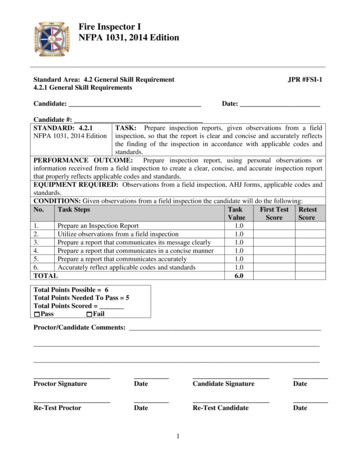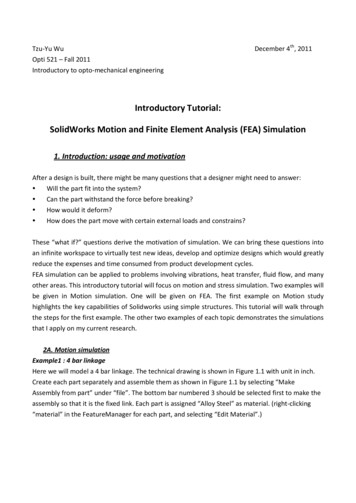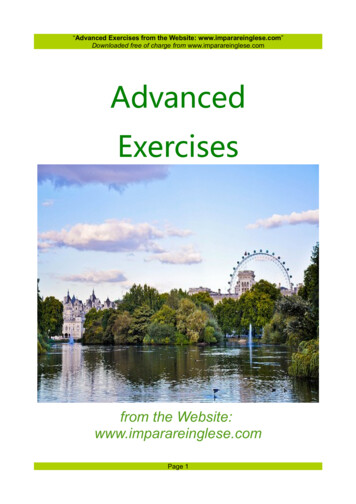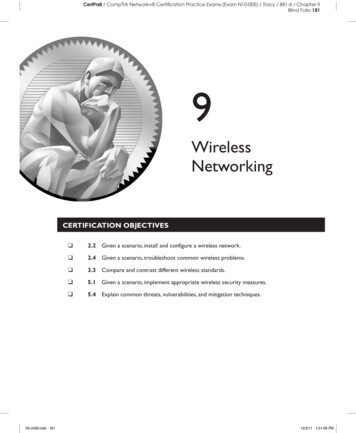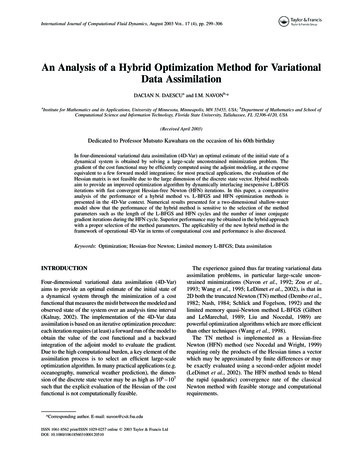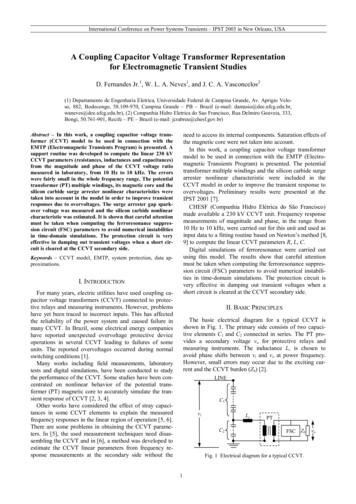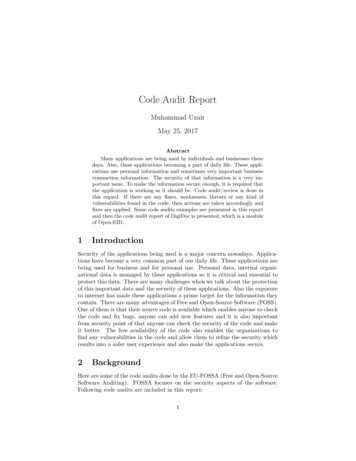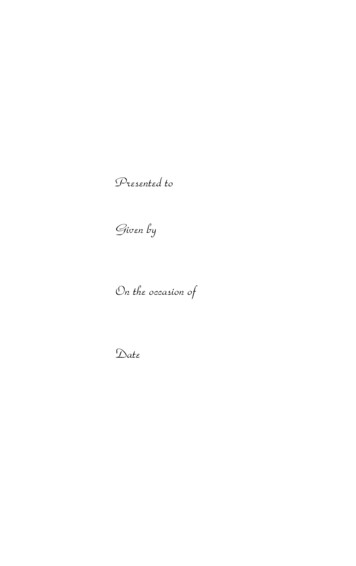
Transcription
Presented toGiven byOn the occasion ofDate
AFIIwww.afii.org
TheOrthodoxJewishBibleTanakhandOrthodoxJewishBrit ChadashaThe Holy Bible
YehoshuaHineiTzemachShmoZecharyah 6:11-12“R. Joshua ben Levi says(Moshiach’s) name is Tzemach ”--Jer. Talmud Berachot Chap 2 Halacha 4And men shall worshipHashem, everyone fromhis place, even all thecoasts and islands of theGoyim. Tzefanyah 2:11
THEORTHODOXJEWISH BIBLEAFI INTERNATIONAL PUBLISHERSP.O. BOX 2056 NEW YORK, NY 10163-2056 U.S.A.internet www.afii.org (212) 245-4188
THE ORTHODOX JEWISH BIBLEFOURTH EDITION Copyright 2002,2003,2008,2010 2011 Artists For Israel Intl Inc.AFI INTERNATIONAL PUBLISHERSTHE ORTHODOX JEWISH BRIT CHADASHA, Fourth EditionCopyright 2002,2003,2008,2010, 2011 Artists For Israel Intl Inc. All rights reservedworldwide. 1st through 3rd editions OJBC 1996,1997,2003,2008 Artists For Israel Intl.Published by AFI International PublishersP.O. Box 2056 New York City, New York 10163, U.S.A.www.afii.orgLibrary of Congress Control Number: 2002107348Up to 500 verses of the OJB may be quoted in any form without writtenpermission, provided no complete book of the Bible is quoted. Notice ofcopyright must appear on the copyright page of the work as follows:Scripture taken from The Orthodox Jewish BibleCopyright 2011 by AFI International.All rights reserved.When OJB quotations are used in bulletins, posters, or other non-commercialmedia, only OJB must appear at the end of the quotation and the completecopyright notice is not required.Any other use of OJB, contact AFII P.O. BOX 2056 NY NY 10163.ISBN 978-0-939341-05-4All rights reservedPrinted in the United States of America
CONTENTS THE TRANSLATOR TO THE READER p. viixTORAHxKETUVIMBERESHIS (GENESIS) [GN] p.1TEHILLIM (PSALMS) [PS] p. 579SHEMOT (EXODUS) [EX] p. 52MISHLE (PROVERBS) [PROV] p. 644VAYIKRA (LEVITICUS) [[LV] p.94IYOV (JOB) p. 668BAMIDBAR (NUMBERS) [NUM] p.127SHIR HASHIRIM (SONG OF SONGS) [SONG] p. 695DEVARIM (DEUTERONOMY) [DT] p.171RUTH [RUTH] p.700xNEVI'IMEKHAH (LAMENTATIONS) [LAM] p.706YEHOSHUA (JOSHUA) [JOSH] p. 209SHOFETIM (JUDGES) [JUDG] p. 233SHMUEL ALEF (I SAMUEL) [1SM] p. 256SHMUEL BAIS (II SAMUEL) [2SM] p. 291MELACHIM ALEF (I KINGS) [1KGS] p. 317MELACHIM BAIS (II KINGS) [2KGS] p. 349YESHAYAH (ISAIAH) [ISA] p. 378YIRMEYAH (JEREMIAH) [JER] p. 431YECHEZKEL (EZEKIEL) [EZEK] p. 487HOSHEA (HOSEA) [HOS] p. 538YOEL (JOEL) p. 545AMOS [AM] p. 548OVADYAH (OBADIAH) [OB] p.553YONAH (JONAH) [JON] p.554MICHOH (MICAH) [MIC] p. 556NACHUM [NAH] p.560CHABAKUK (HABAKKUK) [HAB] p.562TZEFANYAH (ZEPHANIAH) [ZEPH] p. 564CHAGGAI (HAGGAI) [HAG] p. 567ZECHARYAH (ZECHARIAH) [ZECH] p.568MALACHI [MAL] p.577KOHELET (ECCLESIASTES) [KOH] p.712ESTHER [ESTH] p.721DANIEL [DAN] p.730EZRA [EZRA] p.746NECHEMYAH (NEHEMIAH) [NEH] p. 755DIVREY HAYAMIM ALEF (I CHRONICLES) [1CHR]p.769DIVREY HAYAMIM BAIS (II CHRONICLES) [2CHR]p. 797xBRITCHADASHATHE BESURAS HAGEULAH ACCORDING TOMATTITYAHU [MT] p.833THE BESURAS HAGEULAH ACCORDING TOMARKOS [MK] p.870THE BESURAS HAGEULAH ACCORDING TO LUKAS[LK] p. 894THE BESURAS HAGEULAH ACCORDING TOYOCHANAN [YN] p. 935GEVUROT MEYRUACH HAKODESH (ACTS) [AC]p. 966MOSHIACH’S LETTER THROUGH THE SHLIACHSHA’UL TO THE BRIT CHADASHA KEHILLAH INROME [RO] p. 1005MOSHIACH’S LETTER THROUGH THE SHLIACHSHA’UL TO THE BRIT CHADASHA KEHILLAH INCORINTH (I) [1C] p. 1023MOSHIACH’S LETTER THROUGH THE SHLIACHSHA’UL TO THE BRIT CHADASHA KEHILLAH INCORINTH (II) [2C] p. 1040
MOSHIACH’S LETTER THROUGH THE SHLIACHSHA’UL TO THE BRIT CHADASHA KEHILLAH INGALATIA [GA] p. 1051MOSHIACH'S LETTER THROUGH YEHUDA,THEBROTHER OF THE SHLIACH YA'AKOV, TO THEBRIT CHADASHA KEHILLAH [YD] p. 1118MOSHIACH’S LETTER THROUGH THE SHLIACHSHA’UL TO THE BRIT CHADASHA KEHILLAH INEPHESUS [EP] p.1057HISGALUS (REV) [RV] p. 1119MOSHIACH’S LETTER THROUGH THE SHLIACHSHA’UL TO THE BRIT CHADASHA KEHILLAH INPHILIPPI [PP] p. 1063NOTES ON THE TORAH OF THE OJB p. 1208MOSHIACH’S LETTER THROUGH THE SHLIACHSHA’UL TO THE BRIT CHADASHA KEHILLAH INCOLOSSAE [CO] p. 1067OUR MOSHIACH IN THE PRAYERBOOK, p.1226-1228MOSHIACH'S LETTER THROUGH THE SHLIACHSHA'UL TO THE BRIT CHADASHA KEHILLAH INTHESSALONIKA (I) [1TH] p. 1071GLOSSARY p. 1141OJB INDEX p. 1221SOME IMPORTANT RABBINIC QUOTATIONSAND SOURCES p. 1228WHO IS MOSHIACH? p. 1228THE JEWISH CALENDAR AND THE OJB p. 1230MOSHIACH'S LETTER THROUGH THE SHLIACHSHA'UL TO THE BRIT CHADASHA KEHILLAH INTHESSALONIKA (II) [2TH] p. 1075MESSIANIC BAR MITZVAH p. 1231-1232MOSHIACH'S LETTER THROUGH THE SHLIACHSHA'UL TO TIMOTIYOS (I) [1TI] p. 1077MOSHIACH'S LETTER THROUGH THE SHLIACHSHA'UL TO TIMOTIYOS (II) [2TI] p. 1081MOSHIACH’S LETTER THROUGH THE SHLIACHSHA’UL TO TITOS [TI] p. 1084MOSHIACH’S LETTER THROUGH THE SHLIACHSHA’UL TO PHILEMON [PM] p. 1086MOSHIACH'S LETTER TO THE MA'AMINIMHAMESHICHIYIM FROM AMONG THE YEHUDIM[MJ] p.1087MOSHIACH'S LETTER THROUGH THE SHLIACHYA'AKOV TO THE BRIT CHADASHA KEHILLAH[YA] p. 1099ABBREVIATIONS AND DEFINITIONSMOSHIACH'S LETTER THROUGH THE SHLIACHSHIMON KEFA TO THE BRIT CHADASHAKEHILLAH (I) [1K] p. 1104MOSHIACH'S LETTER THROUGH THE SHLIACHSHIMON KEFA TO THE BRIT CHADASHAKEHILLAH (II) [2K] p. 1109MOSHIACH'S LETTER THROUGH THE SHLIACHYOCHANAN TO THE BRIT CHADASHA KEHILLAH (I)[1Y] p. 1112MOSHIACH'S LETTER THROUGH THE SHLIACHYOCHANAN TO THE BRIT CHADASHA KEHILLAH(II) [2Y] p. 1116MOSHIACH'S LETTER THROUGH THE SHLIACHYOCHANAN TO THE BRIT CHADASHA KEHILLAH(III) [3Y] p. 1117cf comparef and followingi.e., [Latin] id est, that isT.N. Translator’s Notesensus literalis (literal sense, i.e., this translationlooks for a word-for-word, literal translation,leaving verb tenses, etc unvarnished, fromthe original language without the use of nonfrum idioms which are by no meansnecessary in any case, since the original is thefount of Orthodoxy, leaving all else sadly not“orthodox” enough—see Gevurot MeyRuachHakodesh 21:19-26)
! " # % ! # # & * ! * # #! / # ! ; * ! * % % # @ \ ! \ & j ! * q z q \ { # / }! & & ! / { # / / & { # q ! ! % * ! z # # # # } } / ; " " ! { ; / } / } } ; " " ! * / } ; ! z # q ! / & ; ; ! ! / ! ! % ! & \ \
# \ # ! / } * & \ @ ! ! & } * } } ; \ # ! % # & # % " ! % ! z " ! " q " ! z % ! \ \ * ! # \ & ! " # # ! \ \ ! ! & # ! & * @ { * } ! & ! { % % ! # & ! ! } & # # ! # / } ! ; { ; & ! } } } } ! # #
are using "lad" and "boy" in some synonymous fashion and it is only our tendentious bias that wouldhave us try to make some vast distinction between the terms. In Genesis chapter 24, Rivkah(Rebekah) is called an "almah" and in the same breath she is also called a "betulah," showing somekind of interchangeable connection between the words. In our illustration, the semantic freightwhich both "lad" and "boy" carry is youth and also maleness, making it possible to use the terms "lad"and "boy" of the same person interchangeably. One could not seriously, for example, use the term"geezer" (elderly eccentric man) and "lad" interchangeably of the same person, and one could not usethe Biblical Hebrew word "zonah" (a non-virgin harlot, prostitute) and "betulah" of the same personinterchangeably (the Hebrew Bible never uses zonah and almah regarding the same person); butthe Hebrew Bible does in fact use "almah" and "betulah" in Genesis 24:43 and Genesis 24:16 of thesame person (Rebekah) because both terms carry the common semantic freight of femaleness andvirginity. In Genesis chapter 24, Rivkah is called an almah and she is also called a betulah,showing that, if not virginal, an almah would not be an almah. In Genesis chp 24 HaAlmah is usedas a synonym for na’arah-betulah. Virginity is at least implicit in the term “almah” or an almahcould not be called a betulah. It would never do in Hebrew, for example, to say that the pilegesh(concubine) approached the well and then say the betulah sat by the well and yet be talking aboutthe same person. Virginity is definitely not implicit in the term pilegesh (concubine). Moreover, as atranslation for "almah," "young woman" destroys the virginal conception of the Moshiach, withoutwhich he is not Ben HaElohim Moshi'a (Savior) of adam's rebellious, sin-blinded progeny. So wesee the verse proves true that says "some twist the Scriptures to their own destruction (2K 3:16)."Those who delude themselves that there is no distinction between “na’arah” (young woman)and “almah” (young virgin) have Biblical useage and context arguing in concert against them.Finally, in Isaiah 7:14 the Jewish rabbis and scholars, who translated the Targum Hashivim[Septuagint Hebrew Bible Greek translation] in the Third Century B.C.E. for the Hellenisticsynagogue, translated the Hebrew word "almah" as the Greek word "parthenos"--which Greek wordcan only mean, according to the standard lexicon, "female of marriageable age with focus onvirginity" [see F.W.Danker Greek-Engish Lexicon, page 777]. Notice other times parthenos("virgin") is used in the Greek NT: Mt 25:1,7,11; Lk 1:27; 1C 7:25; Ac 21:9. The Septuaginttranslators also translated "haalmah" in Genesis 24:43 as "parthenos" showing that both Rivkah thealmah and the mother of the Moshiach, Moshiach who is G-d with us, are both "haalmah" and both"parthenos" and both "the virgin". Let it be said rather bitingly that perhaps these ancient rabbisunderstood the word "almah" somewhat better than we moderns do. J.A. Motyer writes, "In Song ofSolomon 6:8, the alamot [plural of almah], contrasted with queens and concubines, are unmarriedand virgin" (The Prophecy of Isaiah, Inter-Varsity Press, Leicester England, 1993). In conclusion,Isaiah was speaking of the unmarried young virgin. This translation is "orthodox" because it is bothtrue to the Scriptures and it preserves the supernatural entrance (virgin) and exit (empty tomb) ofthe Ben Dovid Ben Elohim Moshiach, the Savior (Goel, Oisleizer) of the World."G-d-with-us" cannot be Hezekiah because Hezekiah had already been born. Moshiach is called notonly "G-d-with-us" but "mighty G-d" (compare Isaiah 9:5[6] and 10:21) and more than once is calledBen HaElohim. (see the OJB translation). Just as Moshiach had a real presence in the wilderness(Num 21:16-18; 1C10:4), Moshiach's real presence in the Bais Dovid forms an eschatological timeline: his coming is in the future when the Bais Dovid will suffer subjugation indicated by the factthat desert food, thickened milk and honey, will be the future oppressive diet (see Isaiah 7:22)because of the capitulation of Ahaz to Assyria, with Assyria's imperial despotic evil having variousfuture manifestations from Babylonian to Roman Imperial kingdoms, until the prophecy to thedynasty of the Bais Dovid is literally fulfilled in Moshiach. When this prophecy achieves itsfulfillment, history would finally confirm that the time line here covers more than 700 years, withonly a handful of years set apart to describe the brief time before Judah's enemies, Syria and thenorthern kingdom of Israel, will pose no more threat to Judah (see Isaiah 7:16).ix
/ ! # " & ! j ; & z & * & " } * & " ; ; & * & " z ! } z ' q z & & q z #q z # q z ' & ' & q & # & & # # # & & ! @ } } ! / { ! ; { ! z # ; # z j/ & ;/ j & ; & ! " & "& & ! \ # * * j " & ! "& & & % & & " & Ιησους # ! ! ! " } } % } ! * ! \ z & " & q * " & " & "& & & "; & * & ; ! ; "& & " & & ; ! / # # # % * } % * " % # # " ! ; { ! ! ! z q * # " j ; " * { # & * % ; ! { # !"! # # ; { " " ;
& ; ! * { # ; # ; ! / # ( % # / ; ( ) % " / ! \ ; ' % ! / \ # z % ; % j# } } j# ! * * " ! * * # * " * # \ * # ! ! \ % / / # / z & & " ¡ & * / ! z # ; } " ! z * q % # } { # } ! } " # } j # z % ! # * ! { # { z # ! / & ; * # & # ; ! / & # ! } ; }} j# } ! # * / ! * / & & z q z / # " ;% q / & ! % } z ; ! z / q z q j & ! / # / } ¡ ; # j# / * ! j ! & / ; * # & * ! # ! *
/ & ! ; }} ! / / * ! ¡ / & } ! / q / # / * ! ! ¡ ! / # ! * / ! * z # / ! ! ! # * ! z j # & # z z ; * * j # / ! # # j # ! # j # 10 / n updated . Some might say that our afii.org Bible Society's Bible, the Orthodox Jewish Bible, is entitled with deception. However, there are many adherents of a sect of Hasidim in Brooklyn, New York, who claim that their Rebbe is G-d and that they are still part of Orthodox Judaism, demanding to have it both ways, as it were. This i basically what is going on in the Beis HaMikdash (Jerusalem Temple) with Paul and James i Acts chapter 21 (see p.996), the two of them wanting to have it both ways. Don't blame afii.org for this; we didn't write the Bible; we just translate it. The fact is, Paul submits his Gospel to a Torah-observant (Ac 21:20) Jewish community deserving of religio licita protection, a Temple- attending (Luke 24:53) synagogue-based (James 2:2, see Greek NT) sect (Ac 24:14) of Judaism who live a Torah-observant life in Jerusalem even though they are Spirit-filled Jewish believers (Ac 2:4, see www.nationaljewishfellowship.org); and in Acts chapter 21 Paul the rabbi from Tarsus submits to their authority and goes into the Jerusalem Temple to show that he too is an "Orthodox" Jew and has not repudiated his Orthodox Jewish faith (Ro 9:1-5), preaching the Good News of Redemption in shul every Shabbos, circumcising the Jewish boy (with a Jewish mother) Timothy (Ac 16:3) and preaching as a rabbi
Jewish Bible Tanakh and Orthodox Jewish Brit Chadasha The Holy Bible . Yehoshua Hinei Tzemach Shmo Zecharyah 6:11-12 “R. Joshua ben Levi says (Moshiach’s) name is Tzemach ” --Jer. Talmud Berachot Chap 2 Halacha 4 And men shall worship Hashem, everyone from his place, even all the coasts and islands of the
